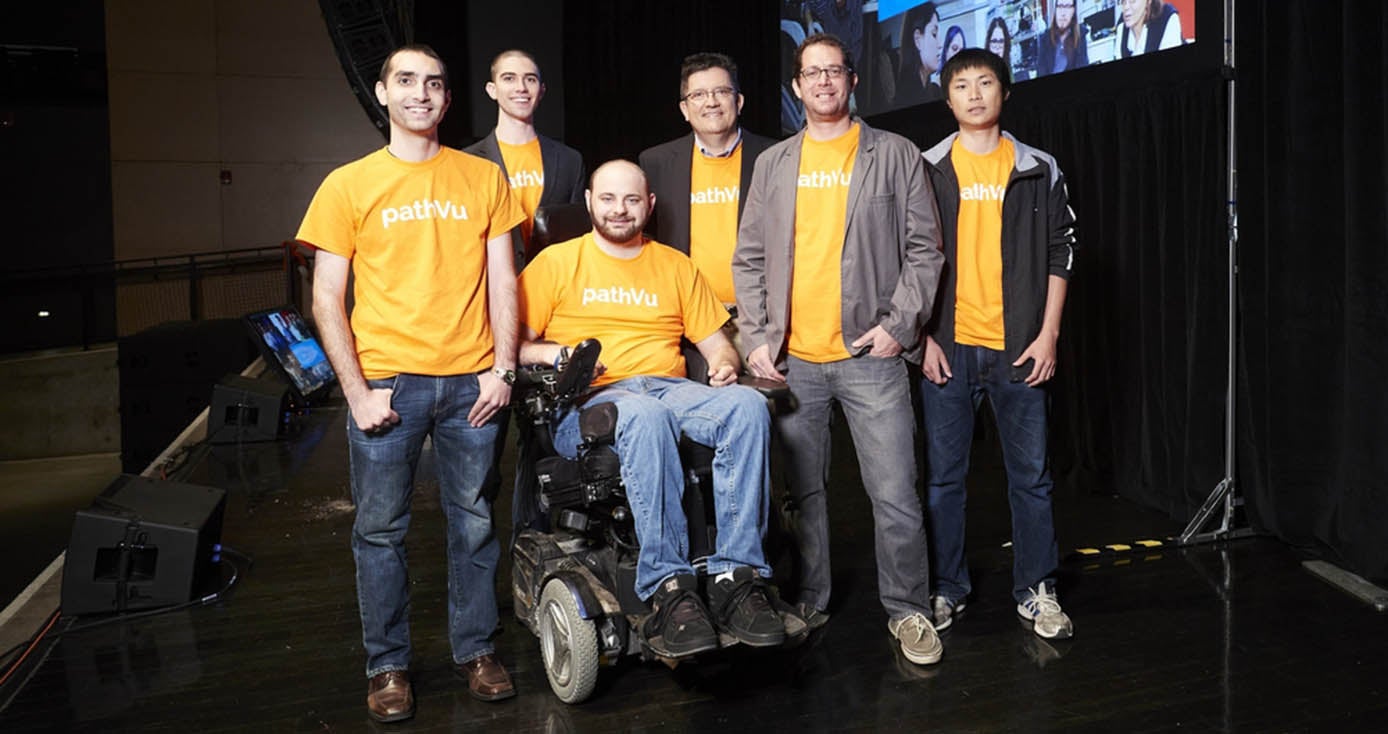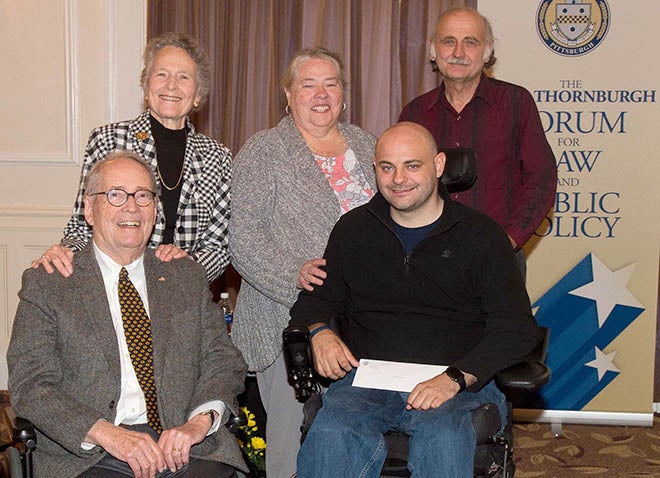
Subscribe to Pittwire Today
Get the most interesting and important stories from the University of Pittsburgh.PhD Student Uses Personal Insight to Drive Research, Help Others With Disabilities
Not only did he found the Students for Disability Advocacy group at the University of Pittsburgh, but all of Jonathan Duvall’s scholarly work — from establishing new ways to detect the roughness of a sidewalk to inventing a simpler way for people who use wheelchairs to weigh themselves — is geared toward making things better for those with disabilities.
Duvall’s years of work were rewarded in October when he received the inaugural Dick Thornburgh Forum Disability Service Award, a $4,000 prize to any Pitt student who has made a difference in the lives of children and adults with disabilities.
And Duvall, 31, who has used a motorized wheelchair since a sledding accident in 2007, is making that difference.
It was while working toward his Pitt master’s degree in rehabilitation science and technology at the School of Health and Rehabilitation Sciences that he became interested in the sidewalk surfaces many take for granted.
“People who have to maneuver wheelchairs over bumpy surfaces are vulnerable to back pain,” he said. “The vibrations travel right up their spines.”
Duvall and his team developed a “pathway measurement tool,” a three-wheeled device that collects high-resolution data on sidewalk length, width, roughness and tripping hazards. The young researchers won first place in the social innovation category at the 2014 Randall Family Big Idea Competition, hosted by Pitt’s Innovation Institute. The $20,000 prize money allowed them to launch their own company, Pathway Accessibility Solutions, Inc., or pathVu. The team developed the first standard for sidewalk roughness that was accepted by ASTM International, whose standards are used around the world to improve product quality and safety.
Amid all of this, the needs of Pitt students with disabilities were also on Duvall’s mind. He helped launch Students for Disability Advocacy and was group president from 2012 through 2015. He has led workshops and group discussions for faculty and staff on how best to interact with individuals with disabilities. In support of Pitt’s Office of Disability Resources and Services, Duvall expanded the offerings, delving into a variety of questions students with disabilities might have.
“What are the best accessible restaurants in this area?” he offered as an example. “What about one-on-one peer support for a student who is struggling?”
His outreach efforts don’t end there. About once a month, he gets an invitation from the UPMC Rehabilitation Institute at UPMC Mercy to counsel a patient who has a new spinal cord injury. Duvall says many patients in this situation have a hard time seeing what they will be able to do instead of what they won’t be able to do.
“I can show them that their life is not over,” he said. “They can pretty much do anything they used to be able to do, just in a different way.”
Randy Williams, education and outreach coordinator at Pitt’s Human Engineering Research Laboratories (HERL), said that for many people, revisiting traumatic events can be difficult.
“But Jon’s story is one of hope and promise for individuals experiencing some of their darkest moments,” he said. “It exemplifies his willingness to give of himself to improve the lives of others.”
A New Endeavor
Now, as he pursues his PhD in rehabilitation science, with a scholarship from the Craig H. Neilsen Foundation, Duvall is dedicating his time to helping people who use wheelchairs to weigh themselves.
He says those who use wheelchairs are actually twice as likely to gain weight than the general population, and it’s not uncommon for them to go years without being weighed.
The new E-scale, developed at HERL, is a bed scale system that consists of a set of sensor pods that slip under the four legs of the bed. A microcontroller analyzes the weights of the bed and the person in the bed, and sends that information to a database, a web portal and an app, so the person can simply view his weight on his or her device.
But Duvall is always thinking one step further.
“We’re thinking the E-scale might be beneficial in nursing homes or acute care centers,” he said. “Caregivers could detect if a person leaves the bed or has been in a static position for a while and needs to be turned.”
Duvall says he is constantly inspired by “seeing people with disabilities struggling to have a quality of life that people without disabilities take for granted.”
His longtime mentor Jon Pearlman, associate director for product innovation and translation at HERL, said “Jon’s perseverance and ambitious approach have impacted and will continue to impact the lives of those with disabilities for years to come.”
As for Duvall, he has his sights set on a career of research and teaching. And in the long term, he would like to be appointed to the National Council on Disability to help frame U.S. policy on disability issues.



